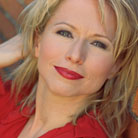Last night the first ever Briton won what is probably the oldest official talent contest in the world and the model for shows like American Idol and the X-Factor. Ayanna Witter Johnson was the joint winner along with Nathan Foley of New York's Apollo Amateur Night competition - the first time there has been a tie in its 70-year history.
Johnson, a singer, composer and cellist who is from north London, performed a self-penned number called "Ain't I A Woman". She says she decided to audition for the competition when she heard about it while studying nearby at the Manhattan School of Music on the upper west side of New York.
Her name is now on a list filled with mind-boggling talent who won past Amateur Night contests, including Ella Fitzgerald, Billie Holiday, Stevie Wonder, Michael Jackson, James Brown and Lauryn Hill.
Billy Mitchell, the Apollo's tour director, says the Amateur Night Competition attracts a different kind of participant than shows like American Idol. "Most people on our show...their families are struggling," he says. But he rates the general talent of people who take part in the contest much higher than participants in shows like American Idol. "The talent seems to be much better - absolutely, without a doubt."
Ralph Cooper, an actor and producer, started the original Harlem Amateur Hour in April 1933 and the show is known for combining the talent show format with a distinctive, vaudeville-like atmosphere, and has depended on audience participation since the very beginning. According to the Apollo's website the "popularity contest has proven an effective measure of star potential, becoming a launch pad for some of the nation's greatest entertainers".
Johnson, a singer, composer and cellist who is from north London, performed a self-penned number called "Ain't I A Woman". She says she decided to audition for the competition when she heard about it while studying nearby at the Manhattan School of Music on the upper west side of New York.
Her name is now on a list filled with mind-boggling talent who won past Amateur Night contests, including Ella Fitzgerald, Billie Holiday, Stevie Wonder, Michael Jackson, James Brown and Lauryn Hill.
Billy Mitchell, the Apollo's tour director, says the Amateur Night Competition attracts a different kind of participant than shows like American Idol. "Most people on our show...their families are struggling," he says. But he rates the general talent of people who take part in the contest much higher than participants in shows like American Idol. "The talent seems to be much better - absolutely, without a doubt."
Ralph Cooper, an actor and producer, started the original Harlem Amateur Hour in April 1933 and the show is known for combining the talent show format with a distinctive, vaudeville-like atmosphere, and has depended on audience participation since the very beginning. According to the Apollo's website the "popularity contest has proven an effective measure of star potential, becoming a launch pad for some of the nation's greatest entertainers".

